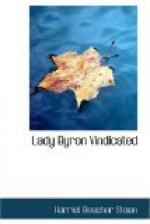I found I was in company with a commanding mind, and hastened to gain instruction from her on another point where my interest had been aroused. I had recently been much excited by Kingsley’s novels, ‘Alton Locke’ and ‘Yeast,’ on the position of religious thought in England. From these works I had gathered, that under the apparent placid uniformity of the Established Church of England, and of ‘good society’ as founded on it, there was moving a secret current of speculative enquiry, doubt, and dissent; but I had met, as yet, with no person among my various acquaintances in England who seemed either aware of this fact, or able to guide my mind respecting it. The moment I mentioned the subject to Lady Byron, I received an answer which showed me that the whole ground was familiar to her, and that she was capable of giving me full information. She had studied with careful thoughtfulness all the social and religious tendencies of England during her generation. One of her remarks has often since occurred to me. Speaking of the Oxford movement, she said the time had come when the English Church could no longer remain as it was. It must either restore the past, or create a future. The Oxford movement attempted the former; and of the future she was beginning to speak, when our conversation was interrupted by the presentation of other parties.
Subsequently, in reply to a note from her on some benevolent business, I alluded to that conversation, and expressed a wish that she would finish giving me her views of the religious state of England. A portion of the letter that she wrote me in reply I insert, as being very characteristic in many respects:—
’Various causes have been assigned for the decaying state of the English Church; which seems the more strange, because the clergy have improved, morally and intellectually, in the last twenty years. Then why should their influence be diminished? I think it is owing to the diffusion of a spirit of free enquiry.
’Doubts have arisen in the minds of many who are unhappily bound by subscription not to doubt; and, in consequence, they are habitually pretending either to believe or to disbelieve. The state of Denmark cannot but be rotten, when to seem is the first object of the witnesses of truth.
’They may lead better lives, and bring forward abler arguments; but their efforts are paralysed by that unsoundness. I see the High Churchman professing to believe in the existence of a church, when the most palpable facts must show him that no such church exists; the “Low” Churchman professing to believe in exceptional interpositions which his philosophy secretly questions; the “Broad” Churchman professing as absolute an attachment to the Established Church as the narrowest could feel, while he is preaching such principles as will at last pull it down.
’I ask you, my friend, whether there would not be more faith, as well as earnestness,




